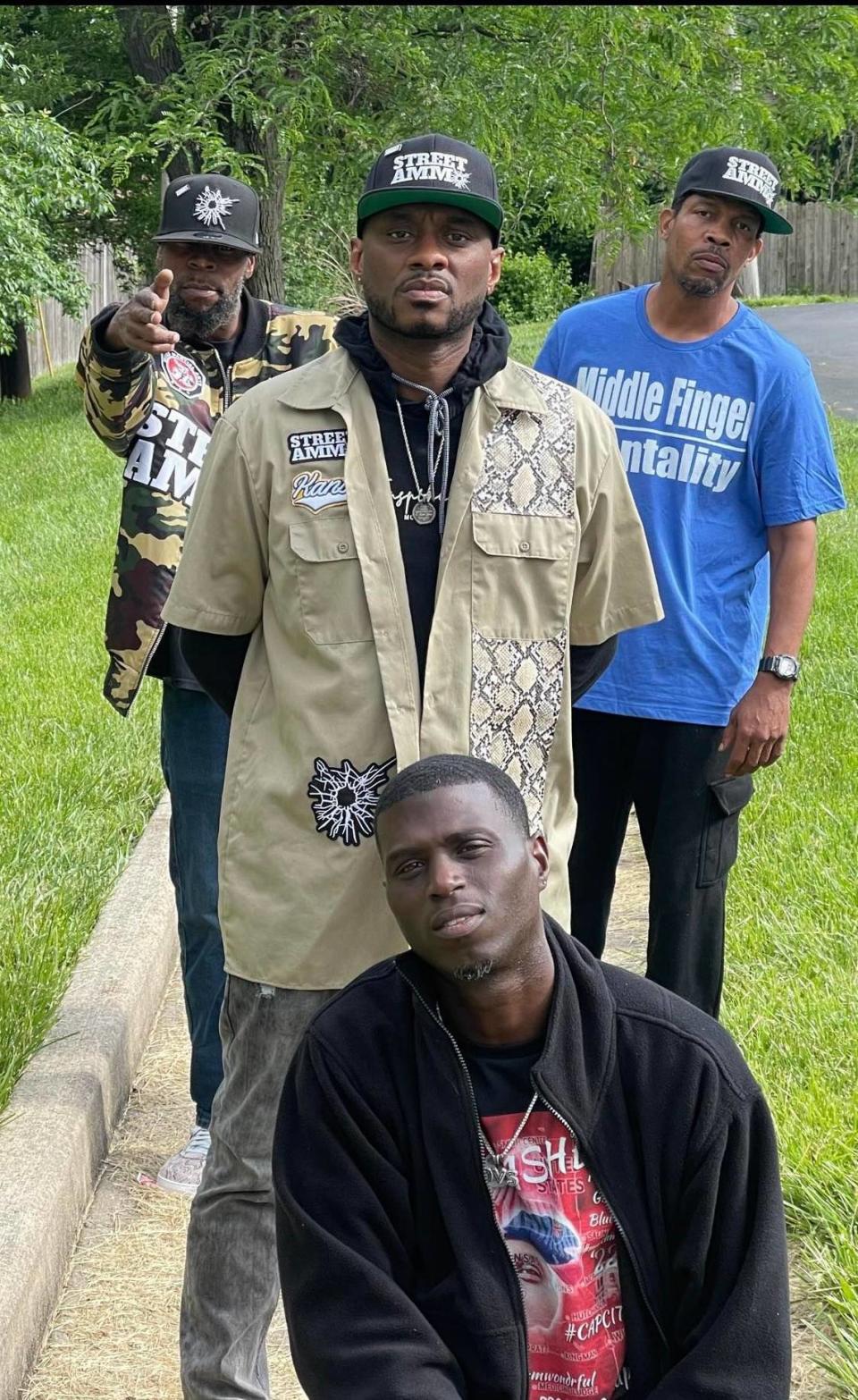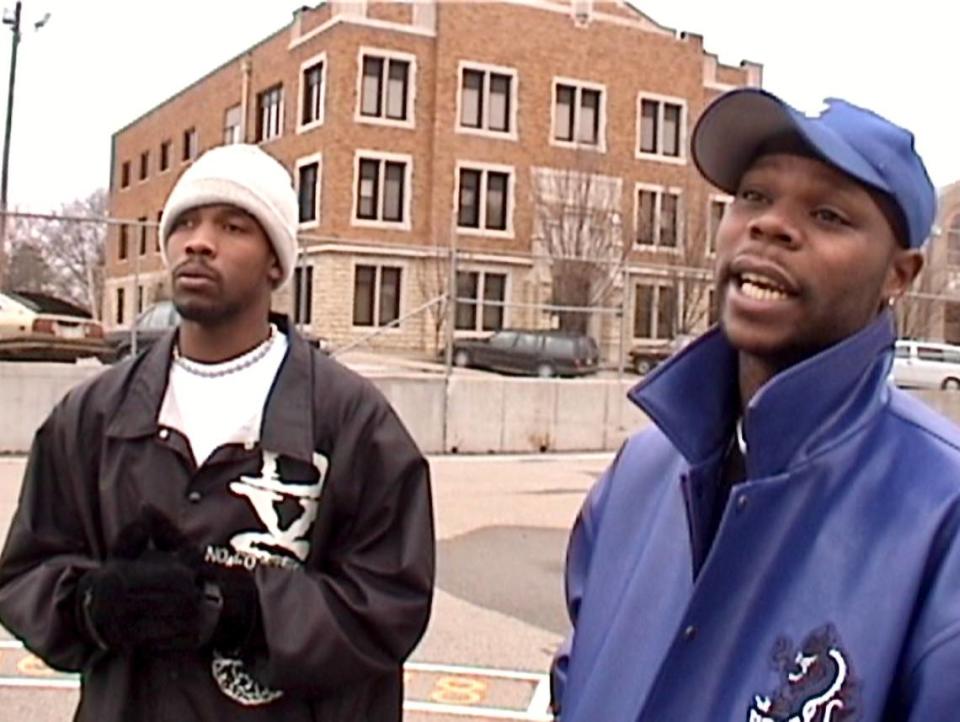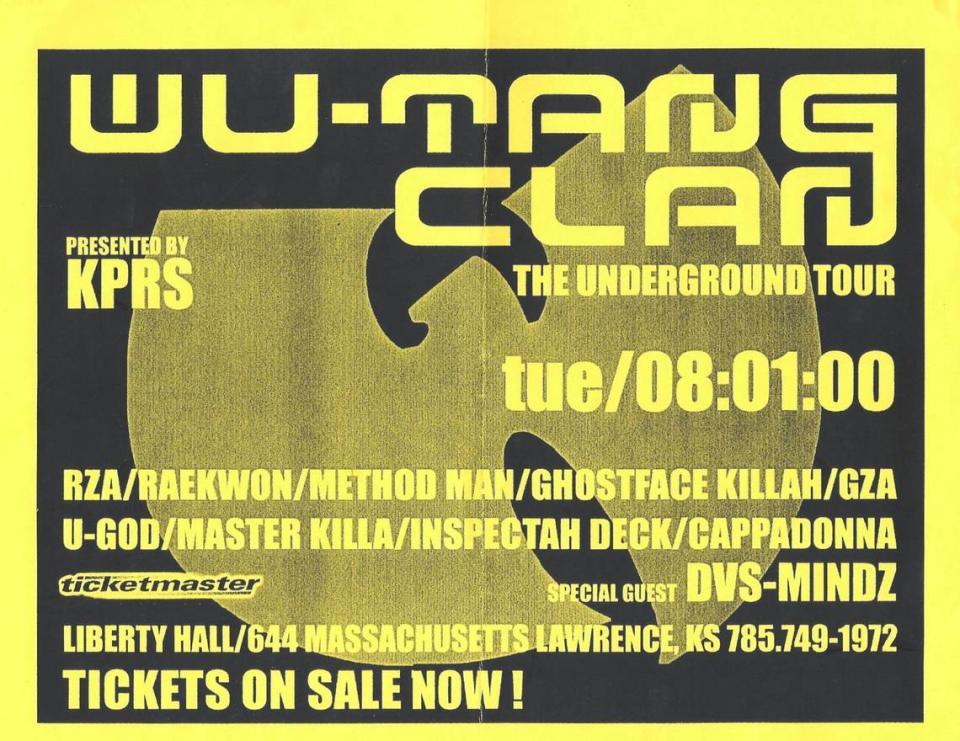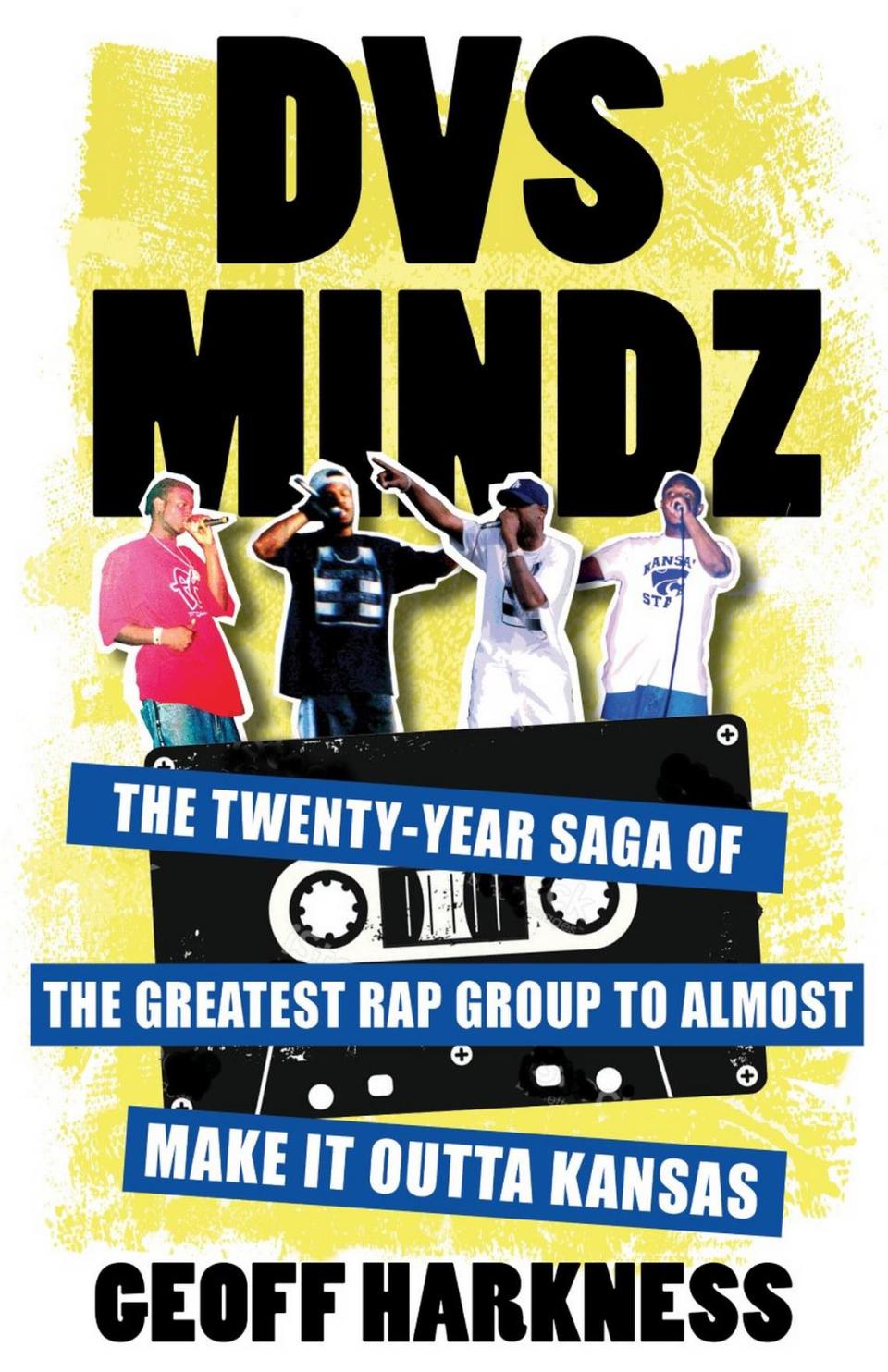‘Greatest Rap Group to Almost Make It Outta Kansas’ sees its story told in new book
You sleepin’ on the Midwest
Here to represent the K-A-N-S-A-S
The first single from DVS Mindz, “Sleepin’ on the Midwest,” proved a rallying cry for aspiring rappers throughout the region who had been overlooked and dismissed by their coastal counterparts.
Formed in Topeka in the early 1990s, DVS Mindz built a loyal following and gained national exposure, opening for legendary artists such as Wu-Tang Clan, Run-DMC and De La Soul.
The band members went their separate ways in 2003. But their story didn’t end …
This is captured in the new book “DVS Mindz: The Twenty-Year Saga of the Greatest Rap Group to Almost Make It Outta Kansas,” written by Blue Springs author Geoff Harkness. It’s published by Columbia University Press on April 18.
“It’s about having a big dream, striving to achieve it and what happens when that dream doesn’t pan out as you’d hoped. In that sense, it’s a very universal story,” says Harkness, an associate professor of sociology at Rhode Island College and a University of Kansas alumnus.

Harkness first encountered the four-piece act in 1999. He got assigned by the Lawrence Journal-World to review the live show of former Wu-Tang founder U-God at The Bottleneck. DVS Mindz — which included Stu “Str8jakkett” Tidwell, Daymond “D.O.P.E” Douglas, De’Juan “DL” Knight and Barry “Killa the Hun” Rice — were booked as the opener.
The aspiring music journalist wrote a rave review under the headline: “U-God Outshined by Topeka Group.”
Tidwell recalls, “I want to say we met that night — and we probably did. But it was the other shows we did after that when we got to know Geoff. He really took a liking to the band and what we represented. He stood with us through the ups and downs, and it’s blossomed into 2023.”
The future sociologist began documenting DVS Mindz, and his book is based on more than 100 hours of video and audio recordings from 1999-2022.
“What struck me most about their music was the lack of conventions,” he says.
“They were almost like punk rock in that there were no rules. I immediately noticed they clearly were going for something different. Their musical vision was much more artistic than it was commercial. They considered themselves to be artists and lyricists, and they took it very seriously.”
The music scene itself was more “serious” back then. The Kansas City region, and Lawrence in particular, during the late ’90s was still enjoying the attention of both major and indie labels hoping to capitalize on breaking a band.
“The scene was extremely strong,” Tidwell says. “Us coming from Topeka, when we started to branch out into areas like Lawrence and Kansas City, we had no idea any of that existed. We honestly felt like we were on a deserted island. The only ones here.”

“Unique and special” is how Harkness describes the rap/hip-hop scene.
“Sometimes it’s hard to see that when it’s occurring in real time, but you need to remember that you have DVS Mindz playing on the bill with Tech N9ne and the 57th Street Rogue Dog Villians (sic) over here. Right down the street, you have Mac Lethal and Approach. Next door is Ces Cru and Deep Thingkers. There was so much emphasis on the live scene and what was taking place in the clubs, and so much of that has gone away in the digital age.”
Harkness noticed when looking back at all the concert footage he had amassed that it truly did seem like a bygone era.
“You don’t see people taking selfies, you don’t see cameras — all of this sort of technology that you find today,” Harkness says. “People were actually just focusing on the concert.”
DVS Mindz flourished in an environment where attention could still be captured.
“One thing we always know we can turn to is our live show,” Tidwell says. “By the end of our set, you’re going to understand why we are who we are.”
As KC producer Steve “Surgeon General” Garcia notes in the book: “What made them special was going back and forth and knowing each other’s words. It was like they’d all wrote each other’s raps. They were like one. That’s why it sounds so organic.”
These skills led DVS Mindz to performances around the nation. But none was bigger than a sold-out show with Wu-Tang Clan at Lawrence’s Liberty Hall.

“For the first five to six years of us being together from ’93, we really had to get out and prove ourselves,” Tidwell says. “But when we opened that show in 2000, the crowd knew who we were. People were singing the lyrics. It was a different feeling. It was an energy that came off that crowd and really fired us up.”
Another career highlight came nearly 20 years later. Back in their heyday, DVS Mindz laid down an essentially improvised track titled “Jim Rome.” The band had a connection to the burgeoning “bad boy” sports talk host, and the idea was that Rome might play a song named for him on the air.
In 2018, that finally became a reality after a fan found the thumping track online and forwarded it to the host. Rome ended up playing it for his 2.5 million listeners, commenting, “These dudes are incredible. … If not for all the references, if you just listened to the beat and the hook, you’d think that thing dropped last week and not two decades ago.”
Harkness’ book isn’t just about these key musical moments; it traces the backstory of the members’ lives. The moments that happen pre- and post-band — stories of family, heartache, substance abuse and redemption — prove just as compelling as the backstage antics. Harkness claims that when he interviewed the group beginning in 1999, he never concentrated on anything personal. The conversations solely focused on the tunes and trying to make it in the industry. Yet when returning to interview them beginning in 2014, he didn’t want to discuss music; he wanted to concentrate on everything else.
“I really didn’t know their life histories,” says Harkness, who, like Tidwell, is 52 years old. “I had no idea what they were about to reveal to me, and they’re incredible stories. You couldn’t write a movie with these plot points and twists.”
Despite having near lifelong bonds with his collaborators, Tidwell also encountered revelation after revelation while reading the book.
“I didn’t know many of the things the others had dealt with growing up. Certain situations were kind of similar, maybe parallel. And those were some of the most shocking things, especially with Barry because we were the same age and had known each other since we were 4.”
What was the most surprising thing Tidwell learned about himself in the book?
“I learned I’m tougher than I thought I was,” he says. “Reading the personal things that I’ve gone through, I realized my life could have gone many different ways. I could have went off the rails a lot of times. But I stayed the course.”
“DVS Mindz” is actually the second book Harkness has written about the rap world. His first (which was based on fieldwork conducted for his dissertation at Northwestern University) was 2014’s “Chicago Hustle and Flow: Gangs, Gangsta Rap, and Social Class.” He followed it up in 2020 with “Changing Qatar: Culture, Citizenship, and Rapid Modernization,” after living in the small Middle Eastern country for three years.
“This new book was very different in that it was not an academic theoretical treatment of what I was writing about,” Harkness says. “I opened up completely new avenues of writing that went places I hadn’t gone before.”

He took inspiration from two rock-centric bestsellers he read as a teenager: “Hammer of the Gods” and “No One Here Gets Out Alive.”
“I didn’t go back and read them because I figured there’s no way they would hold up. What I wanted was to remember what those books meant to me when I was 14 years old, and learning about the myth of Led Zeppelin, the legend of Jim Morrison,” he says.
“In some ways, I was trying to do a version of one of those books.”
While Harkness has lived in other countries and coasts since he first came across DVS Mindz, Tidwell hung slightly closer to home. He lives in Grandview, where he is the head custodian at a middle school. Musically, he continues to be creatively productive.
Tidwell admits he never shares his music with the students because “some of the material is explicit,” he says. But he has mentored his older daughters, who have worked with him on several songs.
Bandmate Douglas now lives near Dallas. Knight and Rice are both in Aurora, Colorado. To varying degrees, they are all still involved in music.
As for the likelihood of a DVS Mindz reunion, the rapper seems optimistic.
“I never say never. There’s always a possibility. There are things in the air right now,” he says.

Harkness hopes readers get compelled to dig deeper into the band.
“For me, DVS Mindz is in my mental jukebox and plays right alongside all the other greats,” he says. “So I don’t distinguish their music from the Beatles or the Wu Tang Clan or anything else that I listen to regularly. It’s in rotation in my head and on my Spotify playlist. So I would love it if more people went back into the videos and songs and discovered all that great music.”
Tidwell concurs.
“I want people to know we did exist,” he says.
“This is a story that you definitely want to hear, especially if you’re from the Midwest. You’ll understand that we didn’t write the book of hip-hop, but we read it. And we managed to put a few chapters in there of our own.”
Jon Niccum is a filmmaker, freelance writer and author. His new book, “With Great Power: Leadership, Character and Conflict Beyond the Superhero Multiverse,” comes out in September.

